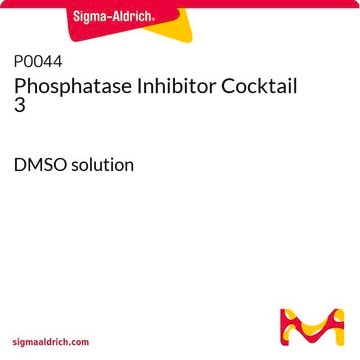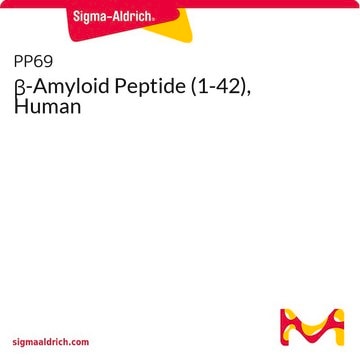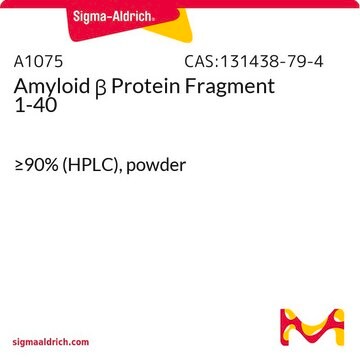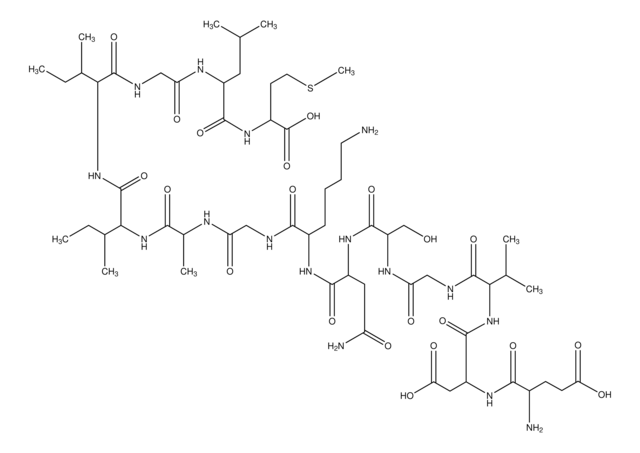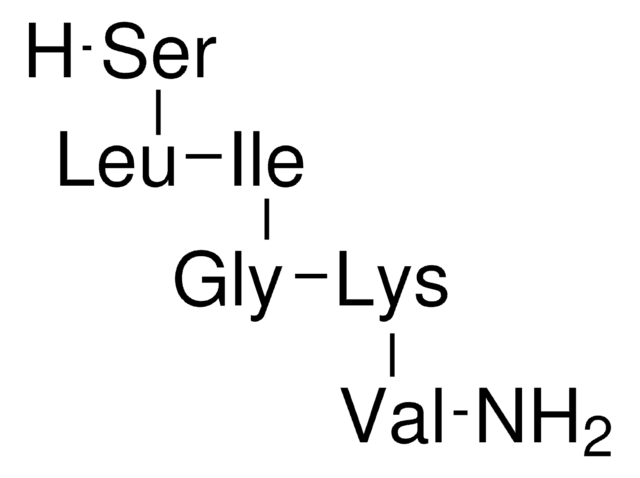SCP0044
Amyloid β 26-35 human
Iniciar sesiónpara Ver la Fijación de precios por contrato y de la organización
About This Item
Fórmula empírica (notación de Hill):
C43H78N12O13S1
Peso molecular:
1003.22
UNSPSC Code:
12352200
NACRES:
NA.32
Productos recomendados
assay
≥95% (HPLC)
form
lyophilized
composition
Peptide Content, ≥68%
storage condition
protect from light
storage temp.
−20°C
Amino Acid Sequence
Ser-Asn-Lys-Gly-Ala-Ile-Ile-Gly-Leu-Met
Application
Amyloid β (Aβ) refers to peptides derived from Amyloid precursor protein that vary in length from 36-43 amino acids. Aβ(s) peptides, their peptide fragments and mutated fragments are used to study a wide range of metabolic and regulatory functions including activation of kinases, regulation of cholesterol transport, function as a transcription factor, and regulators of inflammation. Aβ(s) peptides and their peptide fragments are also used to study oxidative stress, metal binding and mechanisms of protein cross-linking in the context of diseases such as Alzheimer′s disease and neurodegeneration.
Storage Class
11 - Combustible Solids
wgk_germany
WGK 3
flash_point_f
Not applicable
flash_point_c
Not applicable
Certificados de análisis (COA)
Busque Certificados de análisis (COA) introduciendo el número de lote del producto. Los números de lote se encuentran en la etiqueta del producto después de las palabras «Lot» o «Batch»
¿Ya tiene este producto?
Encuentre la documentación para los productos que ha comprado recientemente en la Biblioteca de documentos.
Seung-Pil Yang et al.
Journal of neurochemistry, 93(1), 118-127 (2005-03-19)
beta-amyloid (Abeta) is a major component of senile plaques that is commonly found in the brain of Alzheimer's disease (AD) patient. In the previous report, we showed that an important angiogenic factor, vascular endothelial growth factor (VEGF) interacts with Abeta
Lan Zhang et al.
The journal of physical chemistry. B, 112(30), 8950-8954 (2008-07-03)
Peptide self-assembly on substrates is currently an intensively studied topic that provides a promising strategy for fabrication of soft materials and is also important for revealing the surface chemistry of amyloidogenic proteins that aggregate on cell membranes. We investigated the
Nuestro equipo de científicos tiene experiencia en todas las áreas de investigación: Ciencias de la vida, Ciencia de los materiales, Síntesis química, Cromatografía, Analítica y muchas otras.
Póngase en contacto con el Servicio técnico